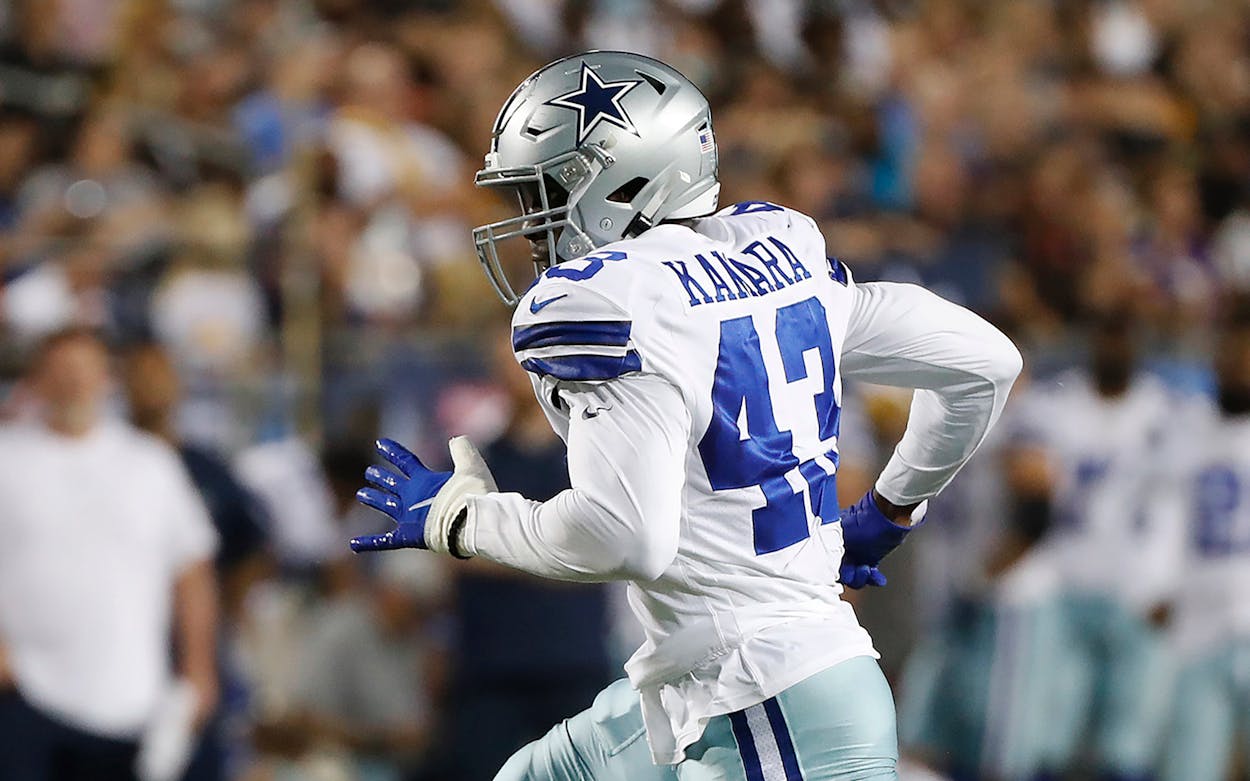An NFL training camp is a merciless exercise in self-reliance. At its uppermost echelon, professional football is so brutally competitive, the athletes so gifted and the learning curve so demanding, that players who’ve dominated every other level of the sport regularly find themselves cast aside, ignored, or simply unable to compete (see: Tebow, Tim).
NFL players whose physical traits are just one step below superhuman yet find a way to stick in the league often have a knack for creating their own luck. They also seem better adapted to harness the power of one of the sports world’s most cutthroat environments without succumbing to it. For Dallas Cowboys linebacker Azur Kamara, who is navigating his second training camp with the team, the key to managing pressure and embracing precariousness would appear to be rooted in a childhood that forced him to master both. Not to succeed on the field, but to survive.
As recently as last week, Kamara, a six-foot-four, 235-pound 22-year-old who played football at Kansas, was virtually unknown to NFL fans. Now that his story has been featured on HBO’s Hard Knocks, the long-running docuseries that embeds with a different NFL team every preseason, that may begin to change. Outside of quarterback Dak Prescott’s return to action following last year’s broken ankle, Kamara’s underdog attempt to make the roster may be the show’s most compelling story line, and for good reason.
Kamara was born in Ivory Coast, a West African nation where soccer has long been king. At a young age, he told Yahoo News, his mother, struggling to clothe and feed her children, abandoned him at a relative’s house across the border in Guinea. With her whereabouts unknown, and his father no longer in his life, Kamara settled into a village existence that included walking miles to retrieve water and sharing a cramped, mud-walled home with more than a dozen relatives. Years later, Kamara’s mother made it to Arizona, where she was seeking asylum after fleeing civil war in Ivory Coast. Eventually, when Kamara was ten years old, he and several siblings—who spoke French and Mandinka, but no English—were able to join her in Phoenix, arriving in a new country confused, overwhelmed, and thousands of miles from anything they’d ever known.
Kamara, shy and mostly friendless, bounced around between middle schools and never considered playing football. It wasn’t until the summer before his freshman year in high school that a coach approached him and suggested that Kamara switch sports from soccer to football. “He told me I looked like a long kid and I should give football a try,” Kamara told USA Today’s Draft Wire. At first, the teenager doubted the coach’s advice. He knew almost nothing about football. But Kamara came around: “My stepfather was with me, and he encouraged me to give it a shot. He told me, ‘You never know what could happen.’”
Despite not knowing the basic rules of the game—or even being comfortable wearing a helmet—Kamara improved rapidly. By his senior season, he had earned first team all-conference accolades on both offense and defense and was named to the All-USA Arizona High School football team. After a stint in junior college, Kamara landed at the University of Kansas on a football scholarship, where he was named Honorable Mention All-Big 12 his senior year, along with earning several academic honors. During moments of stress, when the weight of college football and academics threatened to overwhelm him, Kamara told Yahoo, his mind would return to his past. “My family’s been through too much,” he said. “My mom’s been through too much, to put me in the situation I am today, for me to selfishly let that go.”
A mere eight years after he began playing football, Kamara now finds himself competing for playing time with the Cowboys after spending last year on the practice squad. Local media have embraced his feel-good ascendance, with one Dallas anchor telling viewers Kamara is “living the American dream while playing for America’s team.”
There’s a tendency to oversimplify sweet-smelling success stories like Kamara’s, inadvertently perpetuating the notion that hard work is the only barrier to success for newly arrived immigrants. The truth is more complicated, partly because Kamara’s fate, like that of thousands of Afghan refugees arriving in Texas this month, has largely been shaped by the decisions of authority figures and policymakers—not to mention outright luck. Never was this more clear than during Sunday’s episode of Hard Knocks. Playing a preseason game against the Arizona Cardinals—the first NFL contest his family had ever attended—Kamara got into the game late and quickly forced a game-changing fumble, unleashing a swirl of sideline celebrations. Kamara joined in, thinking his play had delivered the win for the Cowboys and potentially had earned him a roster spot; moments later, the fumble was called back because of a false start.
“Kamara’s strip sack doesn’t win the game,” the Hard Knocks narrator lamented. “In fact, it doesn’t even count.” Moments later, a 47-yard Phoenix field goal sailed through the uprights, sealing the Dallas loss: Cardinals 19, Cowboys 16. Kamara posted a photo on Instagram after the game, showing himself surrounded by beaming family members, including his mother, who wore a bright pink dress for the occasion. “Dreams into reality,” he captioned the image, hinting at the unlikely nature of his current circumstance. “Thank God.”








